Healthy birds for best performance
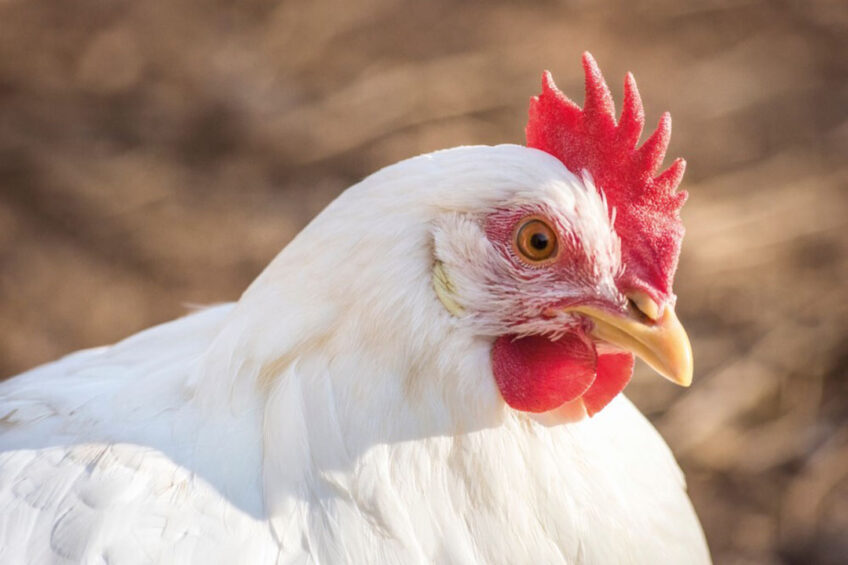
Despite the trend toward vegetarian and vegan, the rising world population demands more animal protein. Poultry production provides a strong mainstay to meet this growing demand. Egg production and broiler farming are highly efficient and, consequently, represent an extraordinarily price-driven market segment.
Since the cost of feed in broiler production accounts for about two-thirds of total production costs, it is a top priority, not only from an environmental viewpoint but from an economic perspective, to pay careful attention to adequate nutrition and efficiency. The better the feed conversion ratio (FCR), the fewer nutrients pass through the gastrointestinal tract unutilised. This also ensures that the feed does what it is supposed to, i.e., to nourish the animals and is not excreted uselessly.
Poor feed utilisation is doubly costly. On the one hand, expensively produced feed will not be metabolised and thus a higher proportion of the investment is lost and creates even more expense in disposal. On the other hand, unutilised nutrients can cause a slight but constant health burden for the animals, e.g., when unutilised protein enters the hindgut where it ferments into harmful biogenic amines and ammonium.
The excretion of unutilised trace elements is associated with more water loss and thus has a negative impact on litter quality. This in turn increases the risk of foot pad dermatitis and finally, has a adverse impact on FCR, animal welfare and feed intake. In general, it is undisputed that the best feed conversion and performance can only be achieved by healthy animals, for which the highest standards of management, hygiene and optimum feed quality are the prerequisites.
Cost of inflammation
Although adjusting management and hygiene standards are probably the most effective parameters for improving performance, a high quality feed and well selected feed additives can add significant value by modulating the gut physiology of the bird. Inflammatory processes are a well known example.
By definition, inflammation is a complex response of the innate immune system in tissues, involving the accumulation and activation of leucocytes and plasma proteins at the site of infection, toxin exposure or cell injury. Inflammation is triggered by a dilation of the blood vessels which promotes leucocyte recruitment. While inflammation has a protective role in fighting infection and promoting tissue repair, it can also lead to tissue damage and disease. Accordingly, inflammation is a physiological defence mechanism, but when it gets ‘out of control’ due to the immune response overshooting, it does more harm than good to an organism.
Even minor inflammatory processes can have a huge impact. Inflammation of the gastrointestinal tract in farm animals, even if it does not lead to a full-blown clinical syndrome, can lead to a severe reduction in performance and thus to economic losses. The production and secretion of inflammatory signalling molecules, as well as changes in metabolism consume energy which is then not available for growth performance.
Inflammation control
Not least due to regulatory restrictions on the of use of in-feed antibiotics, researchers have searched intensively for safe and natural alternatives for controlling pathogenic load and inflammation processes in livestock animals. A fairly novel and very promising approach is the supplementation of selected lignans as bio-active molecules.
Lignans are natural polyphenols found in many plants, where they show protective properties against infection. With the use of wood lignans in humans and animals, anti-inflammatory and antioxidant effects have been scientifically described: they decrease the gene expression of various pro-inflammatory cytokines and bind free radicals, thus reducing lipid peroxidation and the formation of hydroxyl radicals.
The combination of these effects attenuates the inflammatory processes in birds that are permanently challenged by both external stressors (such as flock density, suboptimal climatic conditions, etc.) and internal ones (e.g. rapid growth rate, pathogens, nutrient imbalances).
Since inflammation is a process with intensive energy requirements, its attenuation is a cost-saver and, consequently, this spared energy will be channeled into growth performance. It was on the basis of this scientific backbone that a wood-derived complementary feed (Agromed ROI, Agromed Austria GmbH) was developed containing the bark of a specific tree species rich in lignans and that is known to have anti-inflammatory, anti-bacterial and anti-oxidative properties which will support the animal and optimise its performance.
Lignans’ mode of action
The specially selected wood lignans are highly active in the gut where they reduce the causes and consequences of inflammation by affecting the inflammatory cascade at different levels. First, the development of inflammation is directly modulated through downregulated gene expression of different pro-inflammatory cytokines, such as Interleukin-6 or TNF-α. The wood lignans involved also affect the cell wall integrity of the pathogenic bacteria by increasing its permeability, or even causing lysis of the cell wall.
This, together with the disruption of the bacterial membranes, will constrain bacterial growth, reduce pathogenic pressure and therefore will not lead to an intensive immune response. Fewer pathogenic stressors mean less corresponding formation of free radicals and less reactive oxygen species and thus, less damage to gut tissue.
Together with an increased expression of tight junction proteins, the selected wood lignans improve gut integrity and therefore build up a greater resistance to the paracellular passage of toxins and pathogens, further reducing external stressors.
Proving efficacy
When this scientific evidence was applied on farm, the wood lignans repeatedly affected the zootechnical performance of broilers as had been assumed: the controlled inflammatory response led to an improvement in feed conversion. Figure 1 summarises the efficacy of dietary supplementation of a complementary feed rich in wood lignans, when applied in different parts of the world.
Figure 1 – Overview of FCR- improvement due to supplementation with a wood-derived feed supplement relative to a control group.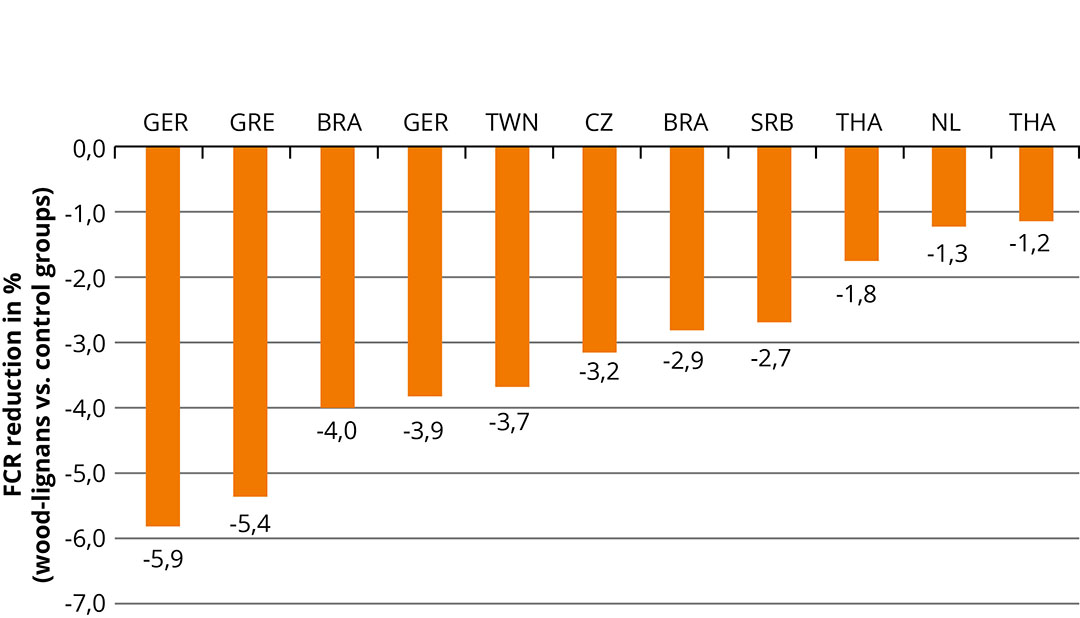
Each bar on the x-axis represents data from a feeding trial conducted with broilers (research institutions, as well as commercial farms), while the y-axis shows the relative change in feed conversion compared to a non-supplemented control group. An average of these feeding trials revealed an improvement in FCR of 3.3% due to the wood-derived feed supplement. A reduction in FCR by 0.1 results in 3% less excretion, which also means 3% less nitrogen and phosphorus excretion as a result. Thus, improving FCR contributes not only to farm profitability but to sustainable poultry production, too.
Join 31,000+ subscribers
Subscribe to our newsletter to stay updated about all the need-to-know content in the poultry sector, three times a week. Beheer
Beheer
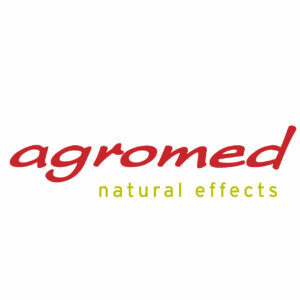
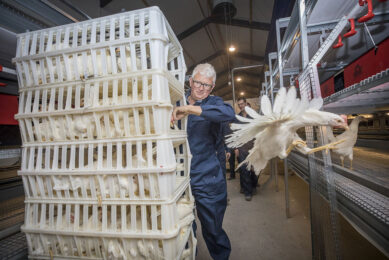
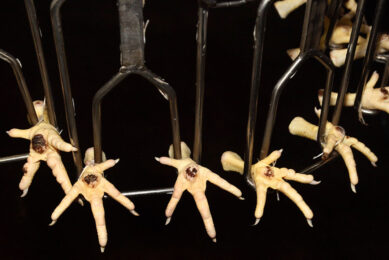
 WP Admin
WP Admin  Bewerk bericht
Bewerk bericht